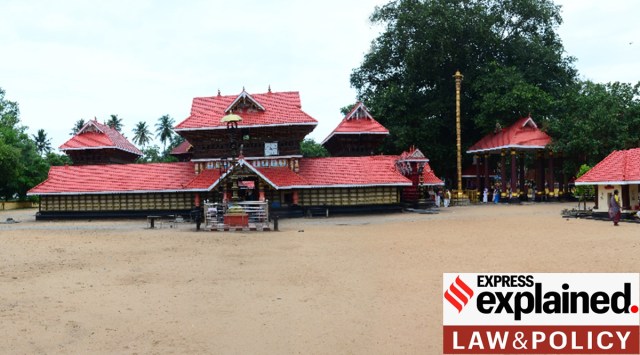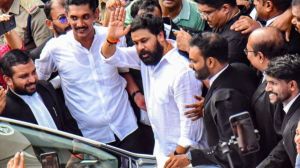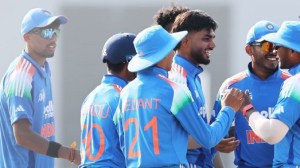Plea against ‘RSS men holding drills’ at Sarkara Devi temple: What is the case
Acting on the plea, filed by “devotees” and those living near the temple, the Kerala HC recently sought the state government’s response.
 The Sree Sarkara Devi temple is located in Chirayinkeezhu, Thiruvananthapuram district. (Photo: keralatourism.org)
The Sree Sarkara Devi temple is located in Chirayinkeezhu, Thiruvananthapuram district. (Photo: keralatourism.org) A plea has been filed in the Kerala High Court against the alleged “mass drills and weapon training activities being conducted by RSS members” in the Sree Sarkara Devi temple in Chirayinkeezhu, Thiruvananthapuram district. Acting on the plea, filed by “devotees” and those living near the temple, the HC recently sought the state government’s response.
A bench of Justices Anil K Narendran and PG Ajithkumar also issued a notice to the respondents, including the alleged RSS members and the Travancore Devaswom Board, which manages the Sree Sarkara Devi Temple. The matter is now expected to be heard on July 6.
Why was the plea filed?
In G.Vyasan & Anr. vs. State of Kerala & Ors, the aggrieved parties approached the court against the “illegal encroachment” of temple premises by two respondents “styling themselves to be members of Rashtriya Swayamsevak Sangh”, who are “conducting mass drills and weaponry training” there between 5:00 pm and 12:00 am every day.
The petitioners contended that although different circulars were issued by the Devaswom Commissioner and the Administrative Officer between 2021 and 2023 to prevent the unauthorised use of the temple and its premises, the same were not “strictly implemented” in vigour and spirit.
Claiming that the right to worship is a fundamental one “guaranteed under Article 21 of the Constitution of India”, the plea contended that the state, among other respondents, is duty-bound to uphold it.
The plea said that the Travancore Devaswom Board and the temple’s administrative officer are also duty-bound to ensure that the temple premises are used only for devotional purposes. The Sree Sarkara Devi Temple is managed by an administrative officer under the control of the Travancore Devaswom Board, an autonomous institution that manages close to 1,200 temples in the country.
Adding that the actions of alleged RSS members were causing “much agony and difficulty to the pilgrims and devotees” visiting the temple and even more so to women and children, the plea stated that the self-styled members were conducting their activities “without any authorisation”.
The petitioners also said the “RSS members” were using tobacco products like pan masala within the temple premises, which was affecting the temple’s cleanliness, purity, and divinity. The unpleasant smell from such products is causing “great discomfort” to the devotees visiting the temple, the plea said.
The plea said that the RSS members “along with their henchmen” shout loud slogans as part of their mass drill and weaponry training, disrupting the “peaceful and serene atmosphere required” at a temple. Owing to the consequent mental stress, agony, and lack of a calm atmosphere, the plea argued that ardent devotees, including senior citizens, found it difficult to visit the temple from 5pm to 12am every day.
Thus, the plea sought the redressal of the petitioner’s grievances within the time fixed by the court and directions to the temple authorities to promptly issue orders preventing the temple’s illegal use and unauthorised occupancy. A direction was sought to the Station House Officer, Chirayinkeezhu Police Station, for providing adequate protection and ensuring strict enforcement of law and order.
What were the two circulars issued by the authorities?
On March 30, 2021, the Devaswom Commissioner issued a circular causing all officers of the Travancore Devaswom Board to stop or prevent the temple’s usage for mass drills or weaponry training.
Following this, the petitioners filed a complaint with the Sarkara Devi Temple’s Administrative Officer to prevent the unauthorised use of temple premises by the RSS members, Vimal and Babu. However, no action was taken, they claim.
Since the actions of the RSS members were “causing a law and order situation on the temple premises” and there was a delay in the officer taking action, the petitioners filed a representation before the Devaswom Commissioner on May 15.
Another circular was issued by the Travancore Devaswom Board on May 18, calling for the 2021 circular’s strict implementation while cautioning against possible strict action against officers who failed to implement the circular.
Aggrieved by the delay and lack of implementation of the circulars, the present case was filed, alleging inaction on the part of the authorities concerned and pleading that the same amounted to a denial of fundamental rights under Article 21 of the Constitution.
- 01
- 02
- 03
- 04
- 05






































